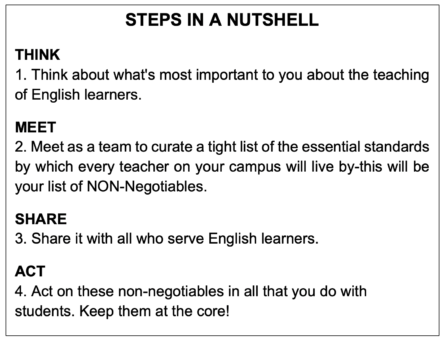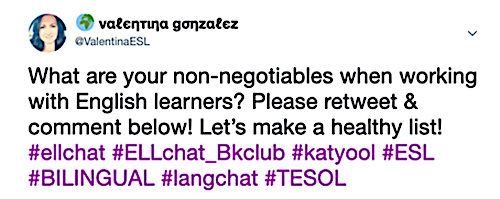Our Non-Negotiables for Teaching ELs
A MiddleWeb Blog

Just imagine if we set aside time as campus or district teams to develop non-negotiables and then we lived by them. This would be a great practice for ESL and bilingual teams. And all teams!
Here are some of the responses:
✻ validate ELs’ identities
✻ instill confidence and empowerment in our multilingual students so they see their language skills as assets and superpowers
✻ all kids are our kids
✻ being bilingual and multilingual is an asset
✻ high expectation and compassion for all
✻ students have access to grade-level curriculum with language scaffolds as needed or not
✻ every student engaged and accountable
✻ teachers who want to teach ELs
✻ EL teachers who are knowledgeable, passionate, and learning too
✻ value and affirm the home language
✻ develop a culturally responsive classroom
✻ create an environment of acceptance
✻ use texts that are culturally relevant
✻ motivate students to tell their story
✻ understand that ESL is not special education or a learning disability
✻ build relationships with families
✻ set and maintain high expectations for learning and believe they are capable
✻ incorporate books and activities that represent ALL kids and all cultures
✻ include visual and wait time
✻ embrace a positive mindset! They can and they will
✻ love and laugh often
✻ show kindness, smile and create a safe space
✻ ensure active EL engagement in critical thinking tasks across the curriculum
✻ critical thinking is a transferable skill across languages – invite translanguaging
✻ every child brings something valuable to our learning community
✻ bilingualism is a superpower
✻ every child will rise to our expectations
✻ they each come with a story and we need to acknowledge that their story is an important part of their identity
✻ acknowledge and support cultural backgrounds
✻ provide the correct linguistic accommodations in order to meet their needs
✻ review vocabulary and build background
✻ use and pronounce their given name correctly
✻ use their prior knowledge
✻ don’t allow failure
✻ reduce the affective filter
✻ praise success
✻ be responsive
✻ provide daily opportunities for speaking
✻ zero tolerance for anyone seeking to police their language
Now build a list of your own
The statements above may help you and your team develop your own non-negotiables. One suggestion is to gather as a group and discuss them as idea-starters. Talk about the ones that stand out most. Can you all agree on some that don’t require any discussion or debate? Some of these can be grouped together into a single statement.
Others may feel more like beliefs to you. You could even go ahead and list your group’s belief statements. It’s best to keep your non-negotiables down to a short list. Narrow them down as much as you can.
Non-negotiables: Standards for our program that are NOT open for discussion.
Beliefs: What you hold true.
Once you have created your non-negotiables (and possibly your beliefs too) keep them at the forefront of your instruction and make them known to all stakeholders.
Administrators and mainstream teachers who also serve English learners need to know what you consider NOT open for discussion. If they are available to take part in the process of creating the non-negotiables and beliefs, even better! Even if one representative from each grade level can participate, they can be the voice for their team.
This process is an excellent way to set the tone as a new school year begins.

Adapted and updated from the English Learners blog.




































Valentina, these are wonderful, and so is the idea of “Non-negotiables.”